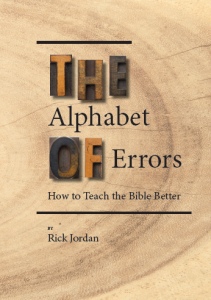Back to Eden
Sometimes, I begin my lessons with a quiz. I do this with stories that we assume we already know such as the story of Adam and Eve.

Here are a few sample questions:
- The name of the man in Eden is…
- Adam
- Tarzan
- Dirt
- He is unnamed
- In Hebrew, the name Adam means…
- Number One
- Man
- Furless leader
- Mudpie
- The name of the woman in Eden is…
- Rainbow
- Sidekick
- Eve
- She is unnamed
- In Hebrew, the name Eve means…
- One who roars
- Life
- Woman
- Second draft
(The answers are at the end of this post. Prepare to be surprised.)
My point is, we do know some things, but as well-known as we think this story is, we still have much to learn.
Pretext

In my video interview to be released this coming Thursday, Robert Canoy makes an important point about “pretext.” The pretext is all we bring to the passage before we even begin reading it. Especially in a familiar text, we might assume, “I already know this story and the point of this story.” Canoy states, “As much as I’ve studied or taught, I still say, when I pick up a Biblical text, ‘Canoy – you’re probably wrong about whatever conclusion it is you’ve reached previously. Own that. Them, listen and see what God may tell you in this.’”
A frustrated Joy
On reflection of that comment, I recalled an incident in my youth ministry days. At the beginning of the Bible study, I announced, “Today, we’re going to look at the story of Noah.” I had hardly gotten the words out when Joy said, “Oh no – not another lesson on Noah! I’ve heard so many lessons on Noah, I’ll puke right here if I have to hear another one!” I asked her to tell me what she learned about Noah in those lessons. It was really no more than what she remembered from the mural in the church nursery. A smiling, grey-bearded, white man holding a staff, guiding pairs of animals out of a large boat that was enveloped by a beautiful rainbow.

Joy would have been right to argue if all we were to do was go over the same facts she already knew from preschool days – Noah was nice. God was nice to Noah. God and Noah saved some animals from drowning. God put a rainbow in the sky so God would remember not to flood all of the earth again.
Diving deeper
But we didn’t go there. These high schoolers needed a deeper reading of the story. Even before any teaching time, as we read the text together, they began to realize that a lot was left out of the nursery mural and from their children’s Bibles. We dove into topics like the tension between God’s wrath and God’s mercy, the fact that this is not the only ancient flood story, and the difference between a literal and non-literal reading of the story. “Wow,” Joy said, “I’ve never heard it taught that way.”

At best, our understanding is incomplete. At worst, our understanding is completely wrong. Normally, we are between our best and our worst and no one’s faith is killed in the process. The hope is that God’s Spirit can work even through our weakest lesson.
You have heard it said…
Jesus was recorded as teaching, “You have heard it said…but I say to you…” Was Jesus saying that committing a murder was not wrong? Of course not. But the teaching was incomplete. Jesus said that he came to fulfill the law and the prophets. That was always done in unexpected ways that had not been taught before.
As you approach this week’s text, humbly accept that your previous lessons have been incomplete, This week’s lesson will be the same. Do the best you can. You are a steward of what God has given you, not of what he has not given you.
Answers!
Oh, and in case you need them, here are the answers:
1-4 Until Genesis 4:25, the Hebrew reads “ha adam” or “the man.” Genesis 4:25 drops the article and “the man” becomes “Adam.”
2-2 “adam” is the Hebrew word for “man” or “mankind.”
3-4 The woman in the garden story is not named until Genesis 3:20, after the story has been told.
4-2 Eve (in Hebrew, havah) means “life” or “living one.”

